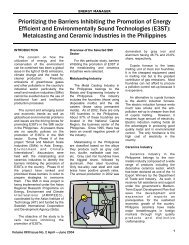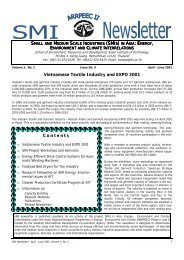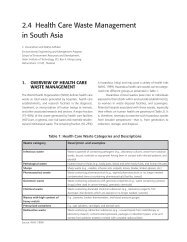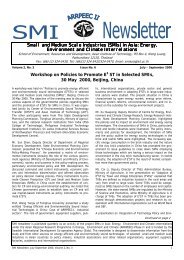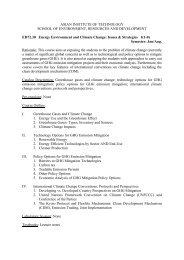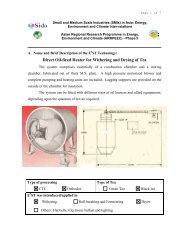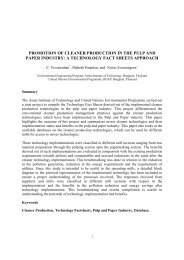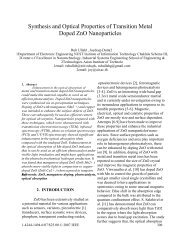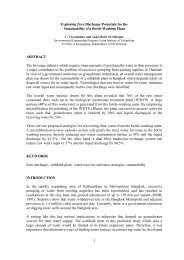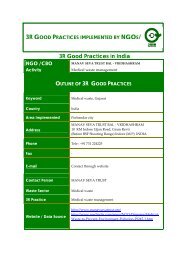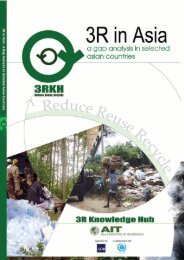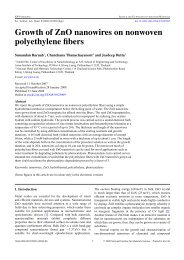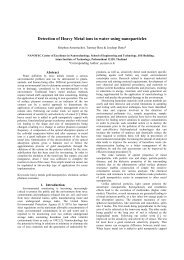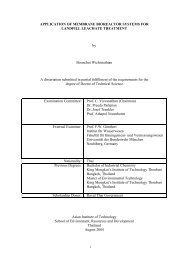Evaluation of Plastic Waste Management in Thailand Using Material ...
Evaluation of Plastic Waste Management in Thailand Using Material ...
Evaluation of Plastic Waste Management in Thailand Using Material ...
Create successful ePaper yourself
Turn your PDF publications into a flip-book with our unique Google optimized e-Paper software.
Group 1: key stakeholders that have high power and high leadership, which can<br />
highly affect the plastic waste management e.g., MNRE, PCD, M<strong>in</strong>istry <strong>of</strong> Energy,<br />
and DIW.<br />
Group 2: stakeholders have the leadership and medium power, and this group<br />
plays the role <strong>of</strong> moderate supporters or moderate opponents such as PIT, TPIA,<br />
TBIA, and local adm<strong>in</strong>istration.<br />
Group 3: this group has a lot <strong>of</strong> resources, but do not have leadership to <strong>in</strong>fluence<br />
plastic waste management by themselves e.g., RDF producers, waste shops,<br />
pelletiz<strong>in</strong>g factory, oil recovery plants and NGOs.<br />
Group 4: stakeholders have fewer resources and may or may not have leadership.<br />
Most <strong>of</strong> them play the role <strong>of</strong> <strong>in</strong>formation providers, dissem<strong>in</strong>ators such as PTIT,<br />
NIA, waste generators, waste pickers, and garbage banks.<br />
The different important stakeholders have the different <strong>in</strong>fluence on the plastic waste<br />
management. The importance and <strong>in</strong>fluence <strong>in</strong> Table 4.8 presents the overview <strong>of</strong> different<br />
stakeholder groups.<br />
Table 4.8 Importance and Influence <strong>of</strong> Stakeholders<br />
High importance<br />
Low importance<br />
A<br />
*PIT *Oil recovery plants<br />
*<strong>Waste</strong> pickers RDF producers<br />
*<strong>Waste</strong> shops *Local<br />
adm<strong>in</strong>istration<br />
*Pelletiz<strong>in</strong>g factory<br />
*Garbage banks<br />
D<br />
*PTIT *NGOs<br />
*NIA<br />
89<br />
B<br />
C<br />
*MNRE *TBIA<br />
*PCD<br />
*M<strong>in</strong>istry <strong>of</strong> Energy<br />
*DIW<br />
*<strong>Waste</strong> generators<br />
Low <strong>in</strong>fluence High <strong>in</strong>fluence<br />
Group A: Stakeholders with high importance and low <strong>in</strong>fluence will require<br />
special <strong>in</strong>itiatives to protect their <strong>in</strong>terest. In case <strong>of</strong> plastic waste management<br />
stakeholders like waste collectors, waste recyclers, and PIT affects the plastic waste<br />
management, but do not hold high <strong>in</strong>fluence on overall plastic waste management<br />
strategies. Nevertheless, these are important stakeholders <strong>in</strong> plastic waste<br />
management.<br />
Group B: Normally government and semi-government organizations fall under the<br />
category <strong>of</strong> stakeholders with high importance and high <strong>in</strong>fluence. For <strong>in</strong>stance<br />
PCD, MNRE etc. These groups <strong>of</strong> stakeholders have the <strong>in</strong>fluence to even make<br />
changes at policy level <strong>in</strong> order to <strong>in</strong>fluence plastic waste management scenario.<br />
These stakeholders should have good relations with all the relevant plastic waste<br />
management aspects and actors for the successful plastic waste management.<br />
Group C: Stakeholders with low importance but high <strong>in</strong>fluence may be sources <strong>of</strong><br />
significant risk and must be monitored so that no negative <strong>in</strong>fluence occurs because




